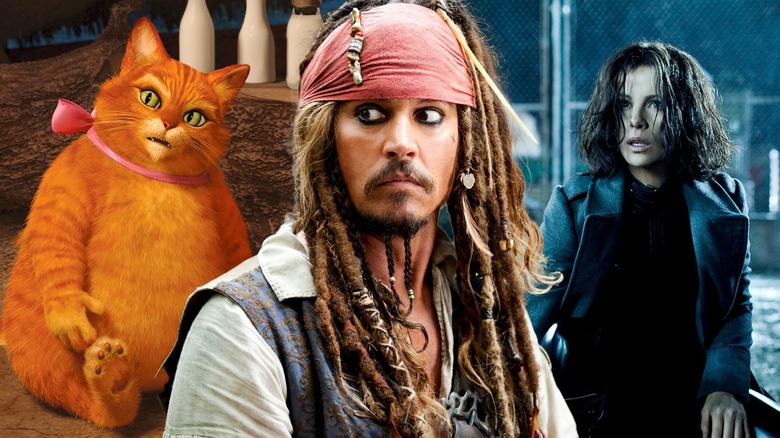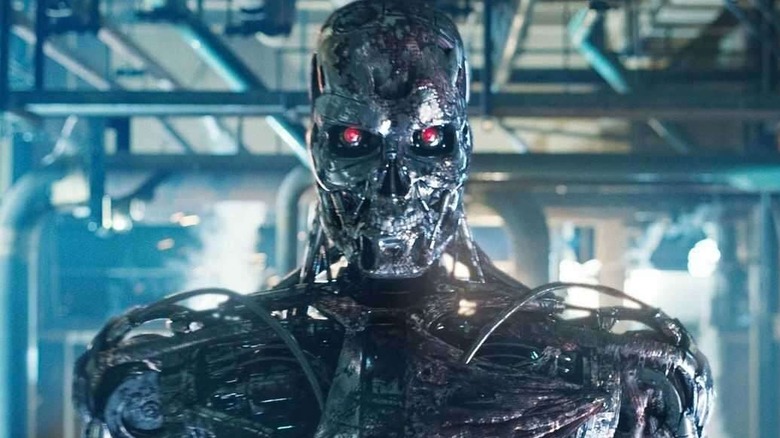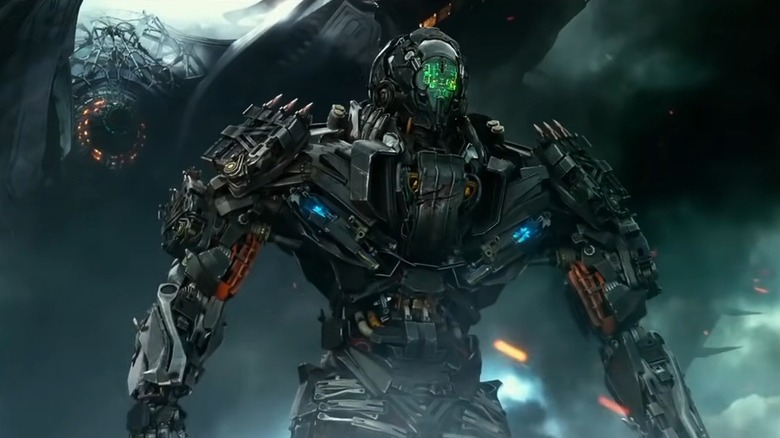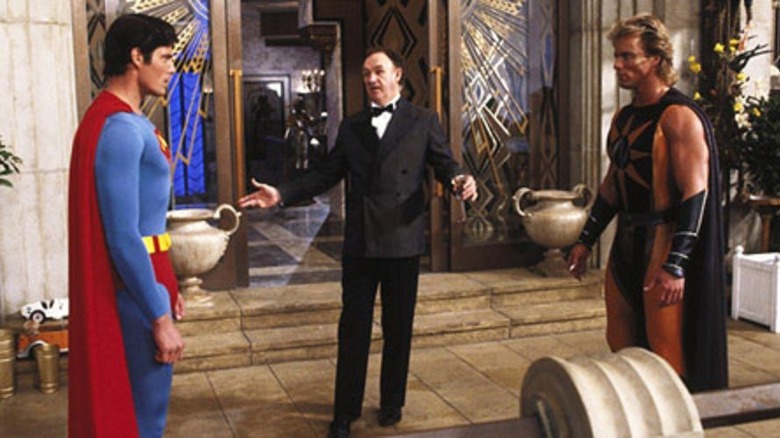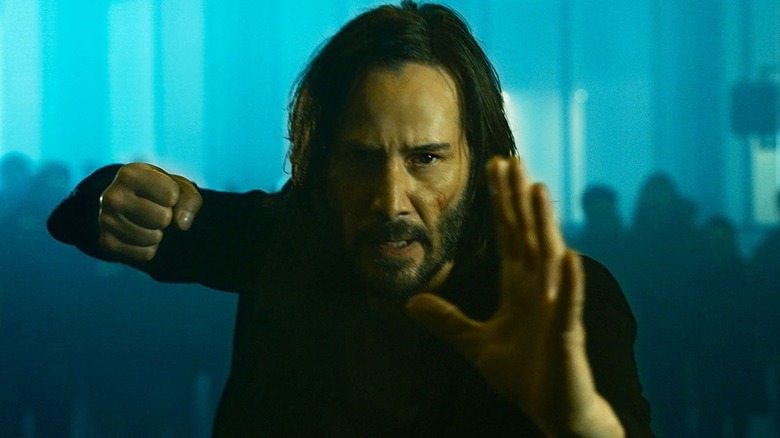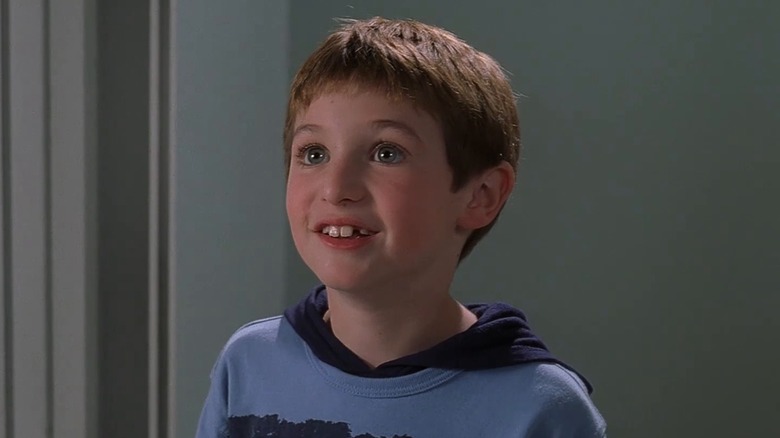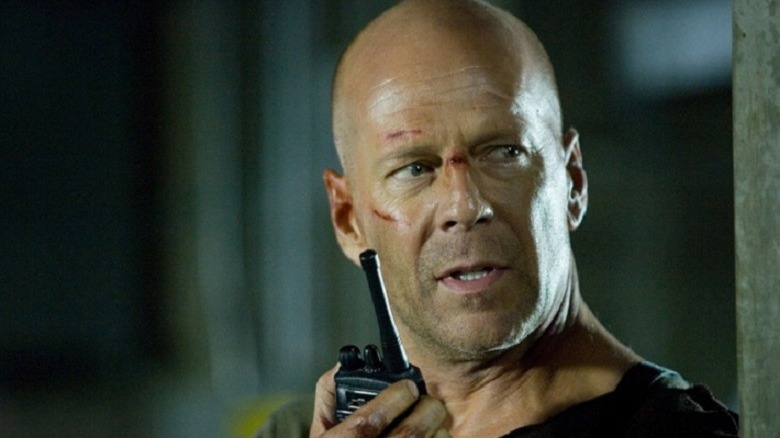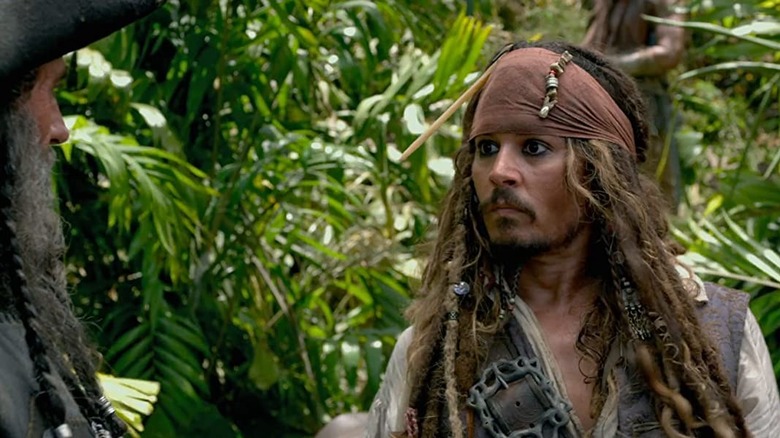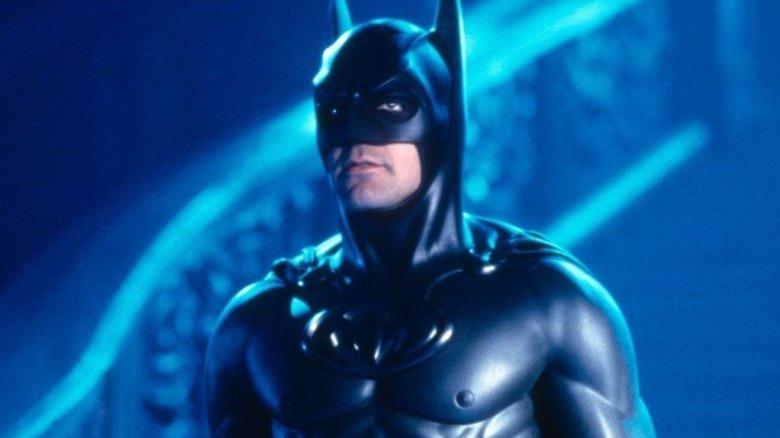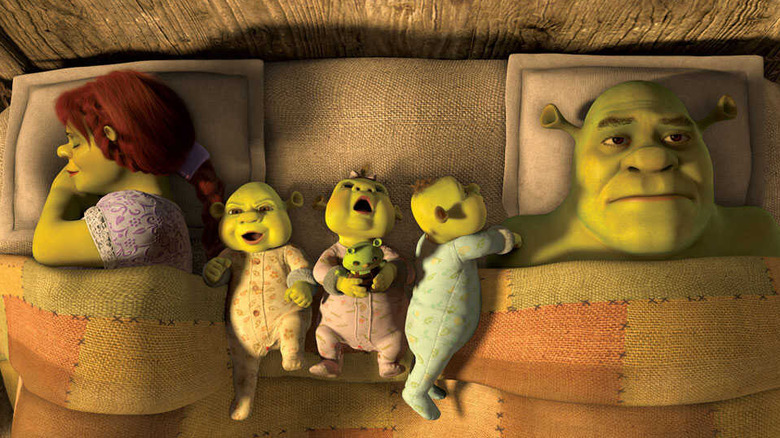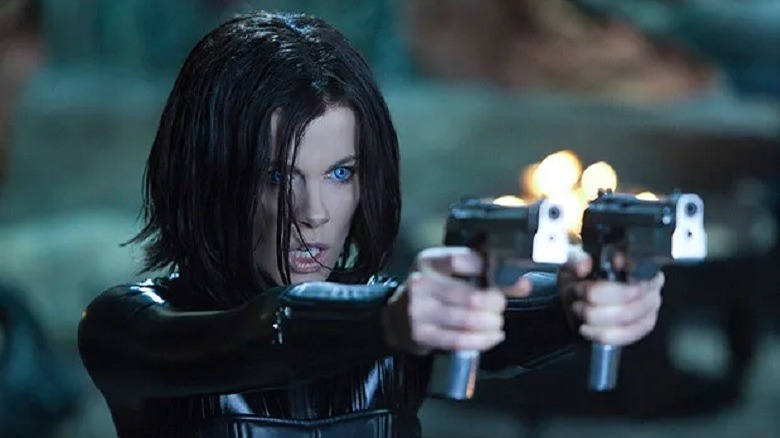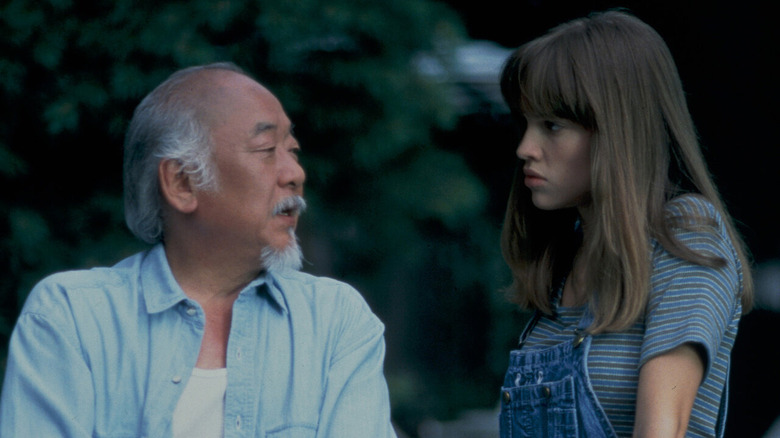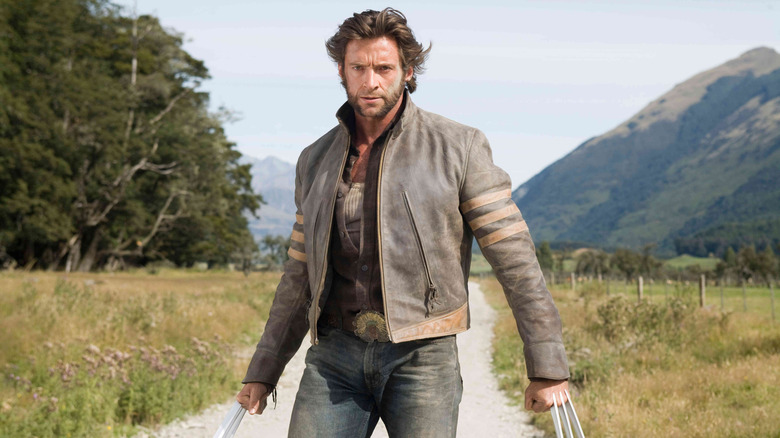Film Series Ruined By An Awful Fourth Movie
If the third time's a charm, what does that make a fourth entry? That's a perennial question that Hollywood asks itself as it maps out film series. Audiences tend to be far more accepting and receptive to movie trilogies, but if a franchise continues past that point, it needs to do something special to captivate the imagination and heart of the viewer.
Some studios use a fourth movie as the starting point for the next phase of the series, often switching out main characters and embarking down a different storytelling path. However, there are severe cases where the films fall flat and do more harm than good in the long run. In some instances, they end up being the death knell in the film series.
Now, this isn't to say that these movies should be scrubbed from the very existence of mankind and buried in the same New Mexico landfill site where Atari made the haunted memories of the "E.T. the Extra-Terrestrial" video game vanish. After all, one person's trash is another's treasure, and everyone is allowed to like what they like. This is simply an analysis of the fourth movies that didn't go according to plan and harmed the franchise in the long run. From "Batman & Robin" to "Home Alone 4," let's take a look at the not-so-fantastic fours in film.
Terminator Salvation
Look, 2003's "Terminator 3: Rise of the Machines" can't touch the toes of its predecessors, but it at least tries to tell a follow-up story that many fans had pondered after the conclusion of "Terminator 2: Judgment Day." The critics agreed, with the general consensus being it wasn't the best film in the franchise but it was a neat and tidy entry, hence the 70% critical approval on Rotten Tomatoes.
Then, "Terminator Salvation" arrived in 2009. It boasts an all-star cast featuring Christian Bale as John Connor, Sam Worthington as the cyborg Marcus Wright, and Anton Yelchin as Kyle Reese. More importantly, the film covers the origin of the T-800 and how the unstoppable Terminator came to be. Unfortunately, it also has the distinction of being a "Terminator" film without Arnold Schwarzenegger, which is basically the equivalent of a Batman movie without the Dark Knight. Fans weren't exactly thrilled that Schwarzenegger's likeness was utilized, but he failed to make an actual appearance here.
Even though this was the first "Terminator" film to truly take the action to the dystopian sci-fi future that everyone feared in the series, there was a massive disconnect between this installment, the audience, and critics. For all intents and purposes, this soft reboot of the franchise was a monumental flop, receiving only 33% critical approval on Rotten Tomatoes and making only $371.4 million at the box office from a $200 budget. Seemingly, the "Terminator" franchise struggled to return to glory after this failure.
Transformers: Age of Extinction
People can say what they want about the first three "Transformers" films, but the unadulterated Bayhem on display was pure money, making over $2.6 billion at the global box office. That said, diehard fans of the animated series and popular toys always wanted the story to shift away from the human characters to focus more on the bots and Cybertron's rich lore. When it was clear that Shia LaBeouf's Sam Witwicky wasn't returning for "Transformers: Age of Extinction," and trailers showed off the Dinobots in action, the audience held thumbs that the fourth movie might be something different.
In the end, "Transformers: Age of Extinction" is essentially the same formula from before with Mark Wahlberg's Cade Yeager and other human characters replacing the previous archetypes. The story beats were the same. The slow-motion scenes were the same. The love story was the same. If this film was made in 2023, it would feel as if someone asked ChatGPT to make a "Transformers" film in the style of Michael Bay. Despite the cookie-cutter approach. "Age of Extinction" made over a billion dollars at the box office, but it also received the lowest critical and audience scores on Rotten Tomatoes until the follow-up, "The Last Knight," proved it could get even worse. Eventually, the franchise was rebooted with 2018's "Bumblebee."
Superman IV: The Quest for Peace
"Superman IV: The Quest for Peace" is a study of how a singular film can destroy one of the most popular IPs in the world. By the time this movie entered production, there wasn't really a demand for it. "Superman III" had seen a drop in its earnings and critical reception, indicating it might have been a good time to wrap up the story as a trilogy. However, The Cannon Group — the renowned film company that could make a blockbuster for the cost of a toasted sandwich — secured the rights to Superman and convinced Christopher Reeve to return as the Man of Steel for another feature in which he had story input.
Speaking about working with Cannon to The Los Angeles Times, Reeve said, "They're like the guy who flies tourist and wants first-class service. I admire their recklessness in buying into 'Superman,' though they do like to nickel-and-dime you on paper clips. But for the most part, we're getting what we want."
Famously, "Superman IV: The Quest for Peace" experienced a tumultuous production, featuring budget cuts, cheap effects, and entire scenes of the movie being trimmed to keep down the costs. Mark Pillow, who played Nuclear Man, explained to Yahoo how most of his scenes were cut and how he had a feeling all was not well. In the end, the film was ravaged by fans and critics, sentencing any potential Superman film to the Phantom Zone for almost two decades.
The Matrix Resurrections
"The Matrix" has always been a peculiar franchise in the sense that everyone loved the first film, but the sequels weren't as universally beloved upon release. They weren't hated, but one would struggle to find someone who listed "The Matrix Reloaded" or "The Matrix Revolutions" as their favorite in the film series. Nonetheless, they stood the test of time, and most fans tend to look back on them more fondly now. More importantly, they wrapped up the story of Neo.
Considering the conclusive nature of the trilogy, eyebrows were raised when it was announced a fourth movie had entered production and would see the return of Keanu Reeves and Carrie-Anne Moss. There were questions. But of course, fans would tune in to see what "The Matrix Resurrections" was all about.
What followed was one of the most divisive responses to a "Matrix" film yet. While the critics gave it 63% critical approval on Rotten Tomatoes, audience members were left confused by what they had seen. The film plays like a meta-commentary on the previous films, while it seemingly brings back these characters for no good reason other than to continue the story. "Resurrections" also bombed at the box office, only making $157 million from a $190 million budget. That said, there's a caveat in the sense that the world was only emerging from the coronavirus pandemic's haze and Warner Bros.' model of dropping cinema releases on HBO Max on the same day didn't help box office numbers.
Home Alone 4: Taking Back the House
"Home Alone 3" had the smarts to change characters when it realized Macauley Culkin took a break from acting, and there was no chance this feature would lure him out of retirement. Was it as good as the previous entries in the film series? No. But it executes a similar premise under an original guise and fans accepted it for what it was.
The made-for-TV "Home Alone 4: Taking Back the House" thought it could capitalize on the original series' popularity and return to the adventures of Kevin McCallister and one of his main nemeses, Marv Murchins, in a new flick. Unfortunately, it recast both roles, as Mike Weinberg and French Stewart replaced Culkin and Daniel Stern respectively. Naturally, fans were having none of it and rejected the film out of principle, especially since the recast actors didn't have the same synergy and magic as the originals.
What is even more insulting is how "Home Alone 4" tries to recreate the exact same gags from the first two movies, but with an Asylum-esque production value and forced humor. Despite the negative reaction and general disinterest in this movie, it didn't stop filmmakers from soldiering on and making further uninspired sequels.
Live Free or Die Hard
Not many franchises manage to hit a home run with the third movie in the series. Yet, "Die Hard with a Vengeance" proves to be the outlier and dishes up an entertaining buddy comedy dynamic between Bruce Willis' John McClane and Samuel L. Jackson's Zeus Carver as they work together to stop Simon Gruber (Jeremy Irons). It might not have been as well received as it could have been when it first arrived in theaters, but it went on to become one of the most beloved action sequels of all time.
As soon as the third "Die Hard" film was released, talks began on a possible fourth movie. However, these discussions went back and forth for almost 12 years before "Live Free or Die Hard" came to fruition in 2007. Based on a John Carlin story titled "A Farewell to Arms" that was first published by Wired, the action film had a healthy budget of $110 million and turned a neat profit of $388 million.
While it is far from the worst action film of all time, it is rather forgettable. The villain is nowhere in the same league as the Gruber brothers and most fans wouldn't be able to recall the plot details of the movie to this day. It also didn't help that the follow-up sequel, "A Good Day to Die Hard," was equally as bland. Maybe "Die Hard" should have ended with the third film.
Pirates of the Caribbean: On Stranger Tides
Indisputably, Jack Sparrow is the most iconic character from the "Pirates of the Caribbean" movies; however, the operative word is "pirates" here. A large part of the franchise's success to that point had come due to the supporting performances from Orlando Bloom's Will Turner and Keira Knightley's Elizabeth Swann. While Captain Jack might have been the main face on the poster and the character with the best lines, Will and Elizabeth were the heartbeat of the story and brought steadiness to the wild adventures.
"On Stranger Tides" — the fourth movie in the series — didn't feature either Bloom or Knightley. In fact, the two actors declined to return for the movie. Speaking to The Independent, Knightley said, "I said when I finished the trilogy that that was going to be it — I had a wonderful time on it and I met some extraordinary people but you know, I think, for me, three is enough, definitely."
While "On Stranger Tides" did feature other returning characters such as Geoffrey Rush's Captain Barbossa and Kevin McNally's Joshamee Gibbs, it simply lacks the gusto and appeal of the previous films. The new cast members didn't possess the chemistry of Will and Elizabeth, and their absence was sorely felt here.
Batman & Robin
Filmmaker Tim Burton redefined the possibilities of comic book movies with the release of 1989's "Batman." He showed how these superhero films could be more than kid-friendly fodder. However, it was this same devil-may-care attitude that resulted in him getting the sack and being replaced by Joel Schumacher for "Batman Forever" — the third entry in the franchise — after his dark aesthetic in "Batman Returns" didn't sell as many toys or Happy Meals as Warner Bros. had anticipated.
While it's generally accepted "Batman Forever" isn't as good as its predecessors, the audiences still had fun with it and it raked in over $330 million at the box office. Expectedly, Schumacher was given the keys to the Batcave for the sequel, "Batman & Robin."
The drama began when Val Kilmer decided he didn't want to be Batman anymore and departed the project, leaving the door open for George Clooney to slip into the cape and cowl. However, the biggest issue was not the change in actors; instead, it was studio interference – something that has become Warner Bros.' specialty when it comes to superhero movies. After the financial success of "Batman Forever," the toy companies and other partners were interested in making as much merchandise as possible out of the film. This impacted the actual quality, as it feels like one giant commercial. The fans and critics saw right through it, and everyone lambasted "Batman & Robin." It also killed any potential Batman movies for eight years.
Shrek Forever After
By the time "Shrek the Third" released, DreamWorks was pushing it. How many times can an unfriendly ogre, his talking donkey friend, and other fairy-tale characters make us laugh until our insides hurt? Well, the studio had the last laugh, as the movie made over $800 million at the global box office. Regardless of what anyone thought of Shrek and its longevity as a franchise, the families turned up in numbers to watch the movies.
As revealed by screenwriter Josh Klausner to Storylink, the original plan for "Shrek" was to end it after five films. Though this changed while the team made "Shrek Forever After," believing it would end the series on a more conclusive note.
While the fourth movie did introduce new characters such as Rumpelstiltskin and different ogres, it was clear the series was on its last legs and stumbling around aimlessly. The jokes and premises are repetitive, and the movie never feels like it will surprise the audience in a positive way. All things considered, it seemed like a wise choice to end the film series there. However, nothing is ever sacred in Hollywood, and there have been talks of more "Shrek" films in the future.
Underworld: Awakening
As an action-horror franchise, "Underworld" strikes a fine balance between the frights and thrilling spectacle. The third movie, "Rise of the Lycans," acts as a prequel, and only features the series' lead Kate Beckinsale in a cameo at the end. After having the missing blanks in the story filled, fans were excited to see Beckinsale return in full force as Selene for 2012's "Underworld: Awakening," which would have taken place after "Evolution" chronologically.
Yet, all the excitement, frenetic energy, and originality from before had been depleted by the time the fourth movie arrived. Critics gave it a shallow 25% approval rating on Rotten Tomatoes and many were left questioning what was the point of continuing the story if it was going to be bland. Another sequel, "Underworld: Blood Wars," dropped in 2016, but even that couldn't give the film series the bite it needed to get back on track to its glory days.
The Next Karate Kid
"The Karate Kid" franchise was built on the chemistry and friendship of Daniel LaRusso and Mister Miyagi. Even though Mr. Miyagi is no longer part of the story in the current era due to the passing of actor Pat Morita, his influence and invaluable lessons can be felt in "Cobra Kai" as well. The first three "Karate Kid" movies established and solidified this bond, as Daniel and Mr. Miyagi helped each other in their own unique way. Then, a fourth film titled "The Next Karate Kid" arrived in 1994 — sans Daniel-san.
Writing in his autobiography "Waxing On: The Karate Kid and Me," actor Ralph Macchio revealed he was never asked to return for the film. In fact, he found out the movie was happening after reading about it in the paper.
In "The Next Karate Kid," Daniel is replaced by Hilary Swank's Julie Pierce as the new lead. Much like the story before, Mr. Miyagi takes Julie under his wing and teaches her karate. However, the audience and critics didn't exactly take to this change in a positive manner, blasting the derivative formula. While Swank's performance was praised, the film stinks up the franchise on Rotten Tomatoes with a 7% critical approval rating and 24% audience score.
X-Men Origins: Wolverine
For the fourth movie in the "X-Men" film series, 20th Century Fox decided to go in a different direction. Instead of releasing a straight-up "X-Men 4," the studio chose to focus on a prequel of the franchise's most popular character: Wolverine. The template for the story was already there in the form of the 2001 six-part comic book miniseries "Origin." All the film would have to do is lift from the source material and adapt it to the big screen. Plus, throw in Hugh Jackman's Wolverine and it's essentially a case of printing money, right?
While 2009's "X-Men Origins: Wolverine" takes influence from the comics, it also veers off down a tangent that didn't leave many viewers happy. For one, the decision to make Sabretooth and Wolverine brothers feels too much like a soap opera twist. Second, Gambit is introduced in the film, but he doesn't play nearly enough of a major role in the film. And finally, there's Deadpool. By refusing to give the Merc with a Mouth a costume and stitching his lips shut, it takes away everything that made the character popular to begin with. In the years since then, Ryan Reynolds' "Deadpool" movies have poked fun at how the character was treated in this adaptation.
There had been plans for a Magneto origin film in the same vein as "X-Men Origins: Wolverine"; however, the less-than-stellar reception towards the film and average box office performance put a pin in the idea.
